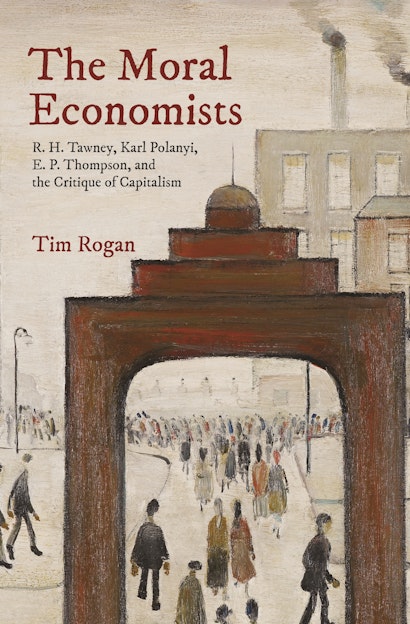What’s wrong with capitalism? Answers to that question today focus on material inequality. Led by economists and conducted in utilitarian terms, the critique of capitalism in the twenty-first century is primarily concerned with disparities in income and wealth. It was not always so. The Moral Economists reconstructs another critical tradition, developed across the twentieth century in Britain, in which material deprivation was less important than moral or spiritual desolation.
Tim Rogan focuses on three of the twentieth century’s most influential critics of capitalism—R. H. Tawney, Karl Polanyi, and E. P. Thompson. Making arguments about the relationships between economics and ethics in modernity, their works commanded wide readerships, shaped research agendas, and influenced public opinion. Rejecting the social philosophy of laissez-faire but fearing authoritarianism, these writers sought out forms of social solidarity closer than individualism admitted but freer than collectivism allowed. They discovered such solidarities while teaching economics, history, and literature to workers in the north of England and elsewhere. They wrote histories of capitalism to make these solidarities articulate. They used makeshift languages of “tradition” and “custom” to describe them until Thompson patented the idea of the “moral economy.” Their program began as a way of theorizing everything economics left out, but in challenging utilitarian orthodoxy in economics from the outside, they anticipated the work of later innovators inside economics.
Examining the moral cornerstones of a twentieth-century critique of capitalism, The Moral Economists explains why this critique fell into disuse, and how it might be reformulated for the twenty-first century.
"The Moral Economists is part historiographical exegesis, part subtle polemic about the limitations of contemporary critiques of capitalism. . . . Rogan looks to history for help in understanding capitalism, its works and its empty promises."—Katrina Navickas, London Review of Books
"A timely, vivid and attractive book, vindicating on every page Rogan’s choice of three musketeers, handing on their flame to their noble heirs."—Fred Inglis, Times Higher Education
"Rogan’s captivating work of intellectual history demonstrates that utilitarianism shaped much of the Left, as well as the Right’s thinking on social questions."—Patrick Diamond, Times Literary Supplement
"Rogan’s reintroduction of Tawney, Polanyi, and Thompson to modern readers is a valuable endeavor."—Joseph Coletti, Journal of Markets & Morality
"In a marriage of historical imagination and brilliant timing, Tim Rogan offers a marvelous survey of ethical critics of capitalism in twentieth-century England. From R. H. Tawney to Amartya Sen, these intellectuals appealed to hidden solidarities to contrast with market values. Rogan participates in their task by concisely and insightfully excavating the context, meaning, and significance of their pioneering contributions, successfully linking their causes to our contemporary quandaries."—Samuel Moyn, Yale University
"This remarkable book tells the story of a British socialism connecting the work of ‘moral economists' R. H. Tawney, Karl Polanyi, and E. P. Thompson. In the twentieth century, the ‘moral economy’ sought to navigate a path between neoliberal individualism and authoritarian collectivism. Tim Rogan impressively charts the difficulties attending this attempt to move from an argument for progressive politics derived from Christianity to one based on modern social science."—Gareth Stedman Jones, Queen Mary University of London
"At a time when the absence of a moral economy is the fundamental shortcoming in politics, Tim Rogan's exploration of the three most important moral economists of the Left is extremely important. This book frames the debate about what a critique of capitalism should look like and Rogan has done us all a great service by writing it."—Maurice Glasman, author of Unnecessary Suffering: Managing Market Utopia
"This important book examines the origins, content, development, and eclipse of the ‘moral economy' in twentieth-century British thought. Richly contextualizing a tradition that sought to critique capitalism in moral terms, The Moral Economists should command attention from intellectual historians, historians of capitalism, and anyone interested in thinking outside the terms of economic discourse today."—Guy Ortolano, New York University
"The Moral Economists provides an original and provocative interpretation of the political thought of R. H. Tawney, Karl Polanyi, and E. P. Thompson. Rogan gives a close and illuminating reading of key texts by these authors, uncovers forgotten intellectual connections that link them together, and reveals a distinctive lineage of social criticism that deserves to be widely discussed. This is a highly impressive, thought-provoking, and timely work."—Ben Jackson, University of Oxford

